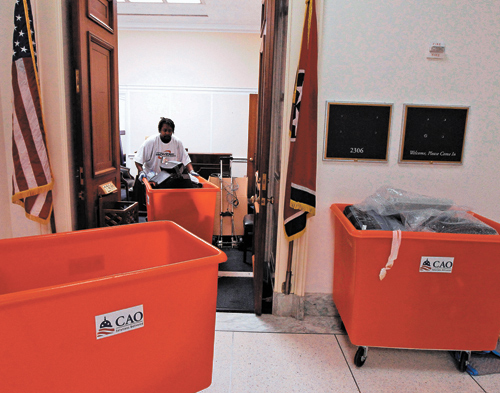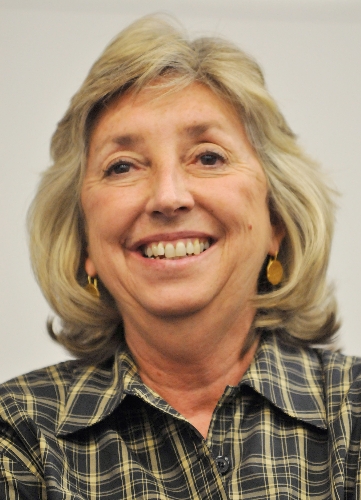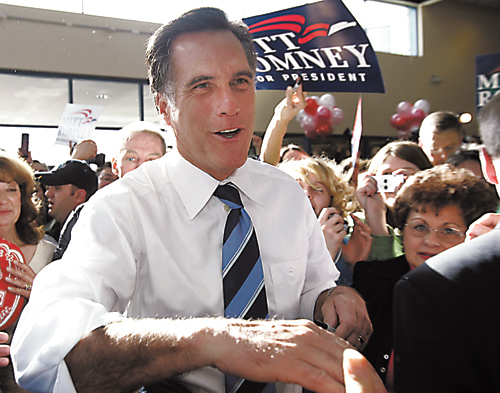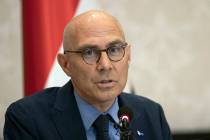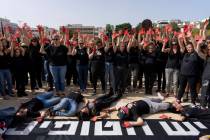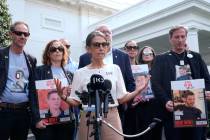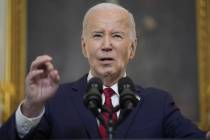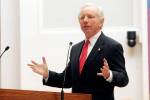House members getting squeezed out
WASHINGTON -- Be they ever so humble, there's no place like the holding areas where outgoing members of the U.S. House of Representatives are working during their lame-duck session this month.
Defeated and retiring lawmakers and their staffs were required to be packed and out of their offices by Dec. 1 so the suites could be repainted and refurbished for their new occupants, who will move in next month.
Problem is, the House is still in session, with members required to at least show up and vote.
So B-339, a banquet room across from the kitchen in the basement of the Rayburn Office Building, has been converted into a bullpen of cubicles, all numbered and assigned to lawmakers who just days earlier enjoyed a much plusher existence. A section of the Rayburn cafeteria also was walled off and subdivided into a similar "Departing Member Support Center."
According to House Majority Leader Steny Hoyer, "We have 82 members who do not have an office. That's a terrible situation to have members in."
In B-339, Cubicle No. 42 is assigned to Rep. Dina Titus, D-Nev., who was defeated on Election Day. Like all the others, it features a desk, two chairs, a computer and telephone. A half-dozen aides take turns using the space, said spokesman Andrew Stoddard.
Titus also has access to a small room on the fourth floor of the Cannon Building, on loan from fellow Rep. Shelley Berkley, D-Nev.
"It is a bit of a challenge, but we are rising to it," Titus said. "We are going to see this to the end, because that is what people voted us in for.
"It's kind of hard to be out of your office when you have another whole month of work to do."
On Wednesday afternoon, Titus arrived to vote in the House chamber carrying her purse and overcoat, suggesting she had just come in from the cold. She still has her apartment a few blocks away, and can work from home.
"That helps a lot," she said. "I know when to come in, and I won't come in if it is just going to be for sitting around."
Tuesday morning, the phone that transfers callers from her old office line to the cubicle was not working properly, but Titus said that has been straightened out.
"We haven't had too many visitors or too many calls," Titus said.
She noted her Las Vegas office won't close until Dec. 17, "so a lot of stuff can be done back there."
But Titus' old Room 319 in the Cannon Building, which brimmed with promise when she greeted a stream of well-wishers on her January 2009 swearing-in, has been cleared out.
"It was sad, but you try to be positive," Titus said. "The saddest moment was when I looked up at the building and the office lights were off and the window was closed, because we always worked late and the lights were blazing and I kept the window open for fresh air."
-- Steve Tetreault
The 2012 presidential race hasn't even begun, yet Mitt Romney seems to already have a head start in Nevada, thanks to name recognition and his winning performance here in 2008.
That's one reason Republican leaders decided last month not to make Nevada's February 2012 GOP caucuses a winner-take-all contest. They wanted to attract all GOP presidential comers to compete for delegates instead of potentially ceding the state to Romney if he jumps into the race.
"I think everyone has to recognize that Mitt Romney will be the front-runner in the Nevada caucuses," said Jack St. Martin, a GOP consultant based in the state. "The question will be how strongly he finishes and who finishes second, and how strong a second."
St. Martin made a presentation about the caucuses at a state GOP Central Committee meeting in Fallon a couple weeks ago. He argued for Nevada's delegates to be distributed on a proportional basis as they were in 2008, when Romney won more than 50 percent of the vote.
As a result of his victory, Romney got 18 delegates instead of all 31 at stake. Texas Rep. Ron Paul and U.S. Sen. John McCain of Arizona each won four. McCain skipped Nevada to compete in the South Carolina primary, which was the same day, then went on to win the GOP nomination.
Former Arkansas Gov. Mike Huckabee and former U.S. Sen. Fred Thompson of Tennessee both won two Nevada delegates. And former New York City Mayor Rudy Giuliani took away one.
The GOP Central Committee also voted to make the 2012 Nevada caucuses binding, which means delegates must stick with their choices through the presidential nominating conventions.
The combination of a binding and proportional contest puts more pressure on Romney as far as meeting expectations for victory. A Mormon, half of Romney's 2008 caucus votes came from members of his religion. So, if he doesn't win Nevada in 2012, his presidential hopes could be dashed early.
"He should have the advantage going in, first with name ID and second because he's got an organization ready to go in a key state," said GOP consultant Ryan Erwin, who helped Romney before in Nevada. "If he runs, of course he starts with a leg up in Nevada."
The Iowa caucuses and New Hampshire primary hold the first presidential contests by tradition, followed now by Nevada and South Carolina, all in February 2012 for Republicans and Democrats.
So far, no Republican White House hopefuls have formally announced, although the early handicapping has begun, led mostly with GOP types already well-known.
Based on previous Nevada experience and name recognition, potential comers likely to do well here include Paul, Huckabee, former Alaska Gov. Sarah Palin, the vice presidential running mate to McCain in 2008, and former House Speaker Newt Gingrich, if they get into the race.
Other potential contenders who are less well-known in Nevada and nationwide include Indiana Gov. Mitch Daniels; Mississippi Gov. Haley Barbour; Rep. Mike Pence, R-Ind.; Minnesota Gov. Tim Pawlenty; U.S. Sen. John Thune, R-S.D.; and New York Mayor Michael Bloomberg.
-- Laura Myers
Congress passed a major childhood nutrition bill last week, but along the way dropped a provision that had been favored by food banks as a way to address weekend hunger.
Over the summer, Rep. Dina Titus, D-Nev., had placed an amendment onto the House version of the bill to expand programs that provide low-income schoolkids with food to take home during weekends and holidays.
In Clark County, the so-called Weekends Without Hunger Act would have aided the Three Square Food Bank, which distributes about 6,000 backpacks each Friday containing five pounds of nonperishables such as canned meat and fruit.
But in order to ease passage during the post-election lame-duck session, congressional leaders chose to advance the Senate version of the nutrition bill, which Titus said did not contain a corresponding amendment.
"That is a real disappointment not to have that in there," Titus said of the provision that would authorize $10 million a year for five years to promote weekend feeding.
Titus said she was trying to find a way to get it passed as a stand-alone bill in the final days of the session.
"We are not giving up on that yet," she said.
-- Steve Tetreault
Contact Stephens Washington Bureau Chief Steve Tetreault at stetreault@stephensmedia.com or 202-783-1760. Contact Laura Myers at lmyers@reviewjournal.com or 702-387-2919.
POLITICAL EYE BLOG



